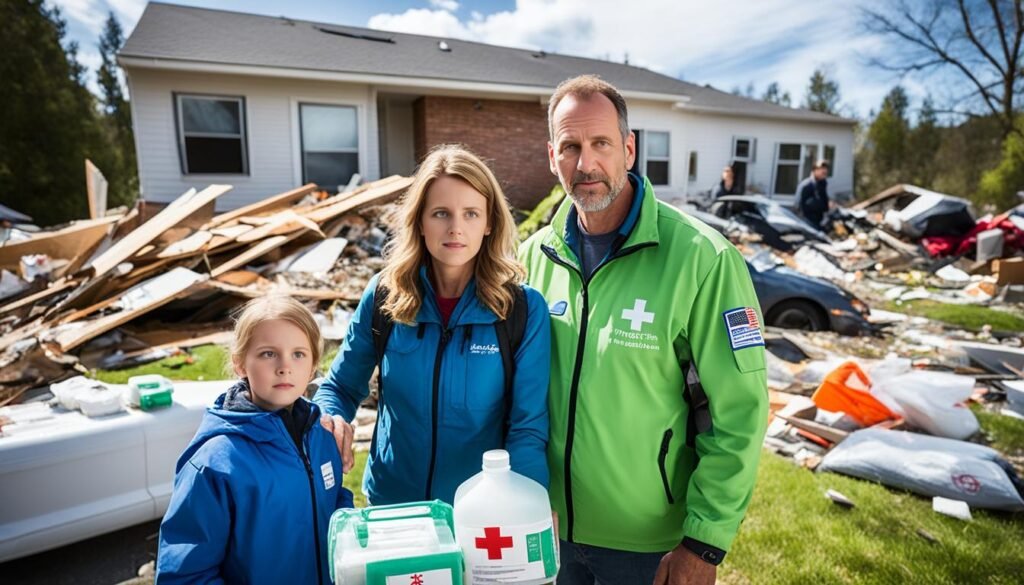A lot of American adults haven’t practiced for disasters or made an emergency plan. FEMA says this could lead to trouble when disaster hits. It’s very important for homeowners to be ready. Make sure you have a solid emergency plan for your home.
Key Takeaways:
- Create a home emergency plan to ensure the safety of your family.
- Consider your unique needs and the specific risks in your area.
- Prepare a disaster supplies kit with essential items for survival.
- Know where to go in different emergency situations and establish a family communication plan.
- Review your insurance coverage to ensure appropriate protection for risks in your area.
Key Steps in Creating a Home Emergency Plan
Getting ready for an emergency is very important. By taking the right steps and being ready, you can keep your family safe when trouble comes. Follow these tips to make a good emergency plan for your home.
Assess the Risks and Make Accommodations
First, look at the dangers in your area like hurricanes or floods. Think about what emergencies you might face. Consider the needs of everyone in your family, including those with medical conditions. Make plans for these specific needs.
“Identifying potential hazards and tailoring your emergency plan accordingly is the first step in crisis readiness,” says Dr. Rebecca Rodriguez, a disaster response expert.
Create a Disaster Supplies Kit
Having a disaster supplies kit is key. Gather items to support your family for at least 72 hours. Your kit should have food, water, medicine, and things for personal care. Remember to include things for kids, seniors, and pets too.
Determine Safe Spaces and Establish a Meeting Spot
Find safe places in your home for emergencies. Pick a basement or a room without windows for emergencies. Also, pick a meeting spot outside your home. This spot is where everyone can meet if you need to evacuate or get separated.
Develop a Family Communication Plan
It’s vital to have a plan for staying in touch during an emergency. Make sure everyone knows emergency numbers and has them saved. Choose someone outside your area to be a main contact. Practice how to communicate so everyone knows what to do.
Practice and Review Regularly
Test your plan by doing drills and practicing how to leave safely. This helps everyone know what to do and makes your response better in a real emergency. Check your insurance often to make sure you’re covered for disasters.
By taking these steps, your home will be ready for emergencies. Remember, being prepared, knowing how to respond, and managing emergencies well are key. A solid plan keeps your home safe during tough times.
The Importance of Insurance in Disaster Preparedness
Insurance is key for homeowners to be ready for disasters. Policies usually cover fires, storms, and theft. They give a feeling of safety in unsure times. But, you may need extra policies for risks like floods or earthquakes.
To have the right coverage, learn about your options. Know your policy’s details, including deductibles and limits. This avoids surprises in a crisis. Doing a detailed home inventory and getting a professional appraisal are good steps. They help figure out how much coverage you need for your things.
Also, making your home safer against disasters can lower your insurance costs. Adding safety features and upgrades does this. It not only protects you better but might also reduce premiums. By doing this, you decrease risks and can save money on insurance.
Get to know the insurance claims process. Collect all important documents and contacts in a disaster folder. This makes the claims process easier and helps you recover faster. Be sure to review your policy often. This keeps you up to date on any changes or things not covered. It helps keep your home and things fully protected.


